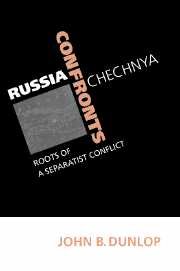5 - Russia confronts secessionist Chechnya, 1992–1994
Published online by Cambridge University Press: 06 January 2010
Summary
If we used force in Chechnya, it would spark an uprising in the Caucasus and lead to such turmoil, so much bloodshed, that no one would forgive us afterward.
Boris Yeltsin in August 1994The post of minister [of nationalities] was occupied by persons who had been raised in the Caucasus and who considered themselves to be specialists in inter-ethnic relations. But it is not enough to be born in the Caucasus to be an expert on the Caucasus.
Valerii Tishkov, former chairman of the Russian State Committee on Nationality AffairsIn the previous chapter, we looked at events taking place during the tumultuous years of 1992–94 largely from the perspective of the separatist Chechen leadership. In the present chapter, our task will be once again to scrutinize this period, but this time chiefly through the eyes of the Yeltsin leadership. As we shall see, the Russian government appeared to lurch convulsively, and often unpredictably, from a conciliatory to a hard-line approach to the Chechen problem until the spring of 1994, when support for a coercive solution began to receive increasing backing at the top.
Russia arms Chechnya
It will be recalled that USSR deputy defense minister Pavel Grachev had traveled to Groznyi in early December 1991 for talks with General Dudaev. The Chechen president had agreed at the time to facilitate a withdrawal of Russian troops from the republic “if a part of their arms and military hardware were handed over to him.” Evgenii Shaposhnikov, at that time USSR defense minister, has claimed that Dudaev proposed to Grachev “a 50–50 split” of the armaments based in Chechnya but that he, Shaposhnikov, had firmly refused this offer.
- Type
- Chapter
- Information
- Russia Confronts ChechnyaRoots of a Separatist Conflict, pp. 164 - 209Publisher: Cambridge University PressPrint publication year: 1998



